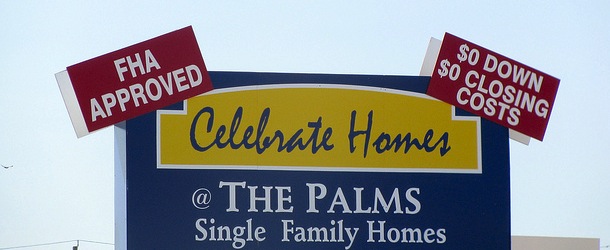Just over a month ago, it seemed as if the FHA was loosening up. They launched the Supplemental Performance Metric, a measure introduced to ensure a lender could offer FHA loans with low credit scores and not be unduly punished for their expected poor performance.
Now, the big banks seem to be saying “no thanks” to the FHA.
Last week, Wells Fargo raised its minimum credit score for FHA purchase loans originated via the retail channel to 640 from 600. It is now aligned with the minimum score required via the bank’s correspondent channel.
This isn’t the first time Wells Fargo has tinkered with FHA minimum credit scores. In the past, they were actually pressured to lower it as the nation’s largest mortgage lender.
As for this most recent move, Wells Fargo CFO John Shrewsbury said the change was intended to avoid making loans close to the “most accommodative end of the credit spectrum.”
In other words, loans at the low-end of what’s allowed in terms of credit score. Why? Because these are the loans that will default, he claims.
And the very same loans they’ll be “arguing about 10 years from now,” vowing not to repeat the same mistakes made in the past.
He has a point. You don’t wind up with a 500 credit score by mistake. And if you do, there’s a decent chance you might default on your mortgage, especially if you put next to nothing down.
Yes, there are exceptions, but these types of loans are clearly riskier than those with higher credit scores and higher down payments.
Chase Chimes In
Now Chase has added their two cents, with Chase Mortgage Banking CEO Kevin Watters referring to FHA lending as subprime lending, though he seems to have mixed up his guidelines.
He told CNBC a combination of 520 FICO score and 3.5% down is subprime lending, but the FHA actually requires 10% down if you have a score below 580.
However, a score of 580 and above only requires a 3.5% down payment, and 580 is still considered subprime, as is any score below 620.
As a result, Chase requires higher-than-required credit scores for FHA loans and prices them higher to compensate for the risk. These overlays are quite common, and add to the confusion consumers feel when applying for such loans.
Yes, technically the FHA allows scores that low, but lenders can set their own minimums, especially if they feel a product will cost them money.
This explains why Chase is the second largest mortgage lender in the country, but not in the top 100 when it comes to making FHA loans.
Why Make Bad Loans?
The issue has to do with defaults, and more specifically, a proposal that lenders certify all their FHA loans are free of mistakes and material defects.
If it turns out the loan was indeed problematic in some way that was overlooked during the required review, the lender could be on the hook for triple damages under the False Claims Act.
But if the loans are clearly high-risk and the damages potentially triple, why make the loans to begin with? Why not just originate plain vanilla loans and jumbo loans to wealthy clients instead?
It seems to be a battle of rhetoric at the moment, perhaps intended to get the FHA to loosen up even more when it comes to making lenders pay for mistakes.
The problem is finding that right balance between affordable housing for all and safe and sound lending.
Sure, there are probably a lot of would-be homeowners out there that deserve a home, even with poor credit. But how can you expect banks to make these loans if they’ll be punished in the process?
Earlier this year, the nation’s largest FHA lender, Quicken Loans, was sued by the Department of Justice for so-called faulty underwriting.
And over the past couple years, FHA loans have been termed a rip-off for consumers and predatory by a former Fannie Mae exec.
Unfortunately, the typical renter needs an FHA loan to buy a home, they just might not be getting it from their local bank.


Valuable perspective on the risk reward balance – a term that has to be applied to the consumer, the lender, the insurer ( actually us on an FHA loan) and even the investors who will ultimately buy the GNMA pools. No wonder they never get it right. It may just not be possible.